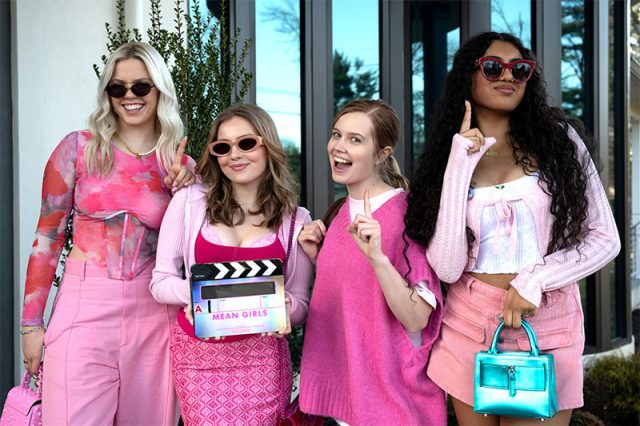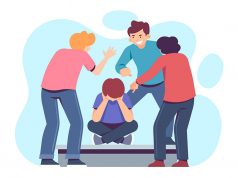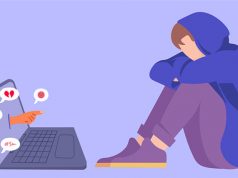The opening shot of the new Mean Girls provides a literal reframing of the 2004 cult classic.
Recording vertical video through a phone, Janis (Auli’i Cravalho) and Damian (Jaquel Spivey) introduce the “cautionary tale” of Cady (Angourie Rice) and her move from being home-schooled in Africa to a North American high school, negotiating “Girlworld” politics and “the plastics” clique to find her true self.
This introduction signifies key changes. Firstly, this is a musical, narrated through the lens of these “art freaks” and puckish best friends. Secondly, much has changed over the past 20 years. In this remake, the style, values and fashion are those of Gen Z – and social media is omnipresent in the teens’ lives.
Mean girls today have a whole new way to be mean.
Shifting landscapes
In 2004, Facebook was limited to Ivy League students. Smartphones were years away. The millennial Mean Girls blocked caller ID to make prank calls “from Planned Parenthood” and used “three-way calling attacks” to create conversational ambushes on landlines.
Most significant was their Burn Book, where they wrote nasty comments about every girl in their year. Regina (Rachel McAdams) used this book to achieve retribution when Cady (Lindsay Lohan) became clique leader. Regina glued her own picture in the book alongside a nasty comment, framed the other plastics, and distributed photocopies to cause a school-wide riot.
Then, bullying was verbal, physical or social. Connectivity was limited and expensive, meaning bullying usually took place in the schoolyard, mall and other physical spaces teens occupied.
The Gen Z Mean Girls exist in an accelerated surveillance culture. School trends go viral, mistakes are meme-ified, and every moment is recorded. Regina (Renee Rapp) is at the centre of this attention economy, crooning that she is a “massive deal” and “the filter you use looks just like me”.
When Cady is invited to join the plastics, her classmates dissect her rise in popularity – and Regina’s downfall – on social media. Research shows using image-based social media, such as TikTok and Instagram, leads to worse mental health outcomes.
The Burn Book still exists in the 2024 film. However, this physical device now seems quaint. Today, the internet gives everyone connected voice and power to be a mean girl. Peers hide behind the screen committing what Ms Norbury (Tina Fey, reprising her role from the original film) calls “girl-on-girl crime”.
Classmates conduct social polling on who is “hotter” between Regina and Cady. They discuss Regina’s weight gain publicly online. When the Burn Book is found, its contents are shared via social media, leading to chaos.
Social media has become a major platform for bullying, which can now occur online 24/7. Adolescents have matured in online spaces, leading to worsening mental health. Parents are struggling too. Due to technological changes, 66% of parents in the United States say parenting is harder now than it was 20 years ago.
Social media bullying disproportionately affects girls. The 2024 film shows how this system fails even those at the top – Regina is just as bullied as the girls she picks on. “Influencers” must maintain a carefully curated image and one mistake can go viral online. Judgement is quick, savage and public.
How to confront bullying in 2024
When Cady is struggling, she turns to her mum (Jenna Fischer), who honestly acknowledges the challenges, saying “you’re learning things now that I don’t know how to teach”.
Rapid technological change means families are often learning new tools together. It is crucial adolescents are not left to navigate this alone.
Whichever generation we identify with, there are strategies we can use to protect our mental health around social media:
- turn off notifications so you choose when to use the device. Set a time limit for usage each day and stick to it
- focus on wellbeing. Keep devices out of bedrooms. Ensure breaks are taken from screens. Time spent offline in nature is particularly restorative
- discuss what is seen online. Be aware of the constructed nature of social content, including filters and image editing. Highlights reels should not be compared to our daily lives
- reflect on privacy and what you want to share with the world. Even images or text shared in a private channel can be screenshotted or downloaded. Legislation is slow to catch up with technology. For example, teens sharing nude photos with peers can be charged with child pornography distribution in many jurisdictions
- take feelings seriously. Disconnect as a first strategy, and uninstall platforms that have a negative impact. Gain support from real world friends and family.
Mean Girls shows the dangers of popularity and models ways to maintain agency and self-worth. Recognising her own problematic behaviour, Cady reconstructs her identity with support from friends, gaining recognition for her intellectual ability as a mathlete.
Janis provides a more radical response, rejecting socialisation that rewards artificial niceties and breeds duplicity in girls, a system wherein “boys get to fight, we have to share”.
Janis offers another way to deal with online and offline bullies and retain self-worth, encouraging peers to “solemnly swear ‘whatever they say about me I don’t care!’”. ![]()
Jennifer Stokes, Senior Lecturer in Digital and Information Literacy (Education Futures), University of South Australia. This article is republished from The Conversation under a Creative Commons license. Read the original article.










